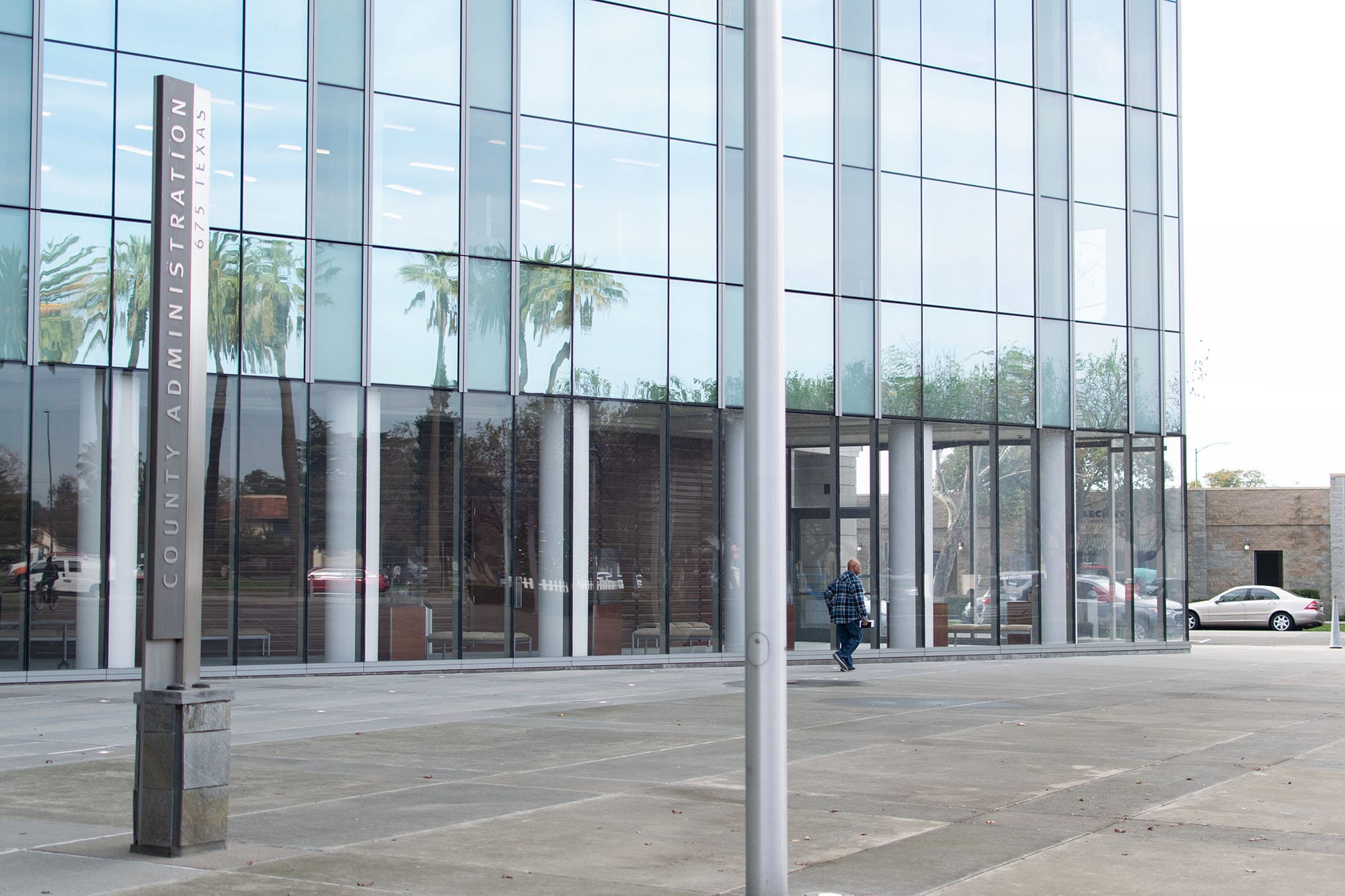VALLEJO – The Vallejo City Council took the first step Tuesday to amend the city’s budget to accommodate a $6.15 million bailout of a partially built North Vallejo supportive housing project after city staff requested emergency funding from the city’s new sales tax revenue.
Staff requested that the shortfall be covered by the city’s eighth-of-a-cent sales tax known as Measure P, which voters approved in 2022. Despite the six-to-one vote to approve the move, the council stopped short of deciding whether to use Measure P funding or to draw on the city’s reserves to pay for the shortfall.
The 47-unit supportive housing project on Broadway street — intended for Vallejo residents who are chronically homeless or for persons with severe mental disabilities — is 70% complete, but construction on the project has been stalled since September of 2023 due to financial problems.
Contractors have since filed mechanics’ liens against the property and additional costs due to the work stoppage ballooned the project’s price tag from $22 million to $26.6 million.
The city is now up against looming grant funding deadlines that require the supportive housing facility to open and begin offering services by December. If it doesn’t meet that deadline, the city may have to pay back a significant portion of the $20 million in grant funds that have already been spent on the project.
“We are now in a reality situation where we either solve the problem or it gets much more expensive,” Mayor Robert McConnell said after referring to the project as a “financial catastrophe.”
In January of 2022, then City Manager Michael Malone estimated that the cost to build the housing project would be about $9.6 million.
McConnell pointed out that, in discussions leading up to approval of the project, staff had claimed that the city was not exposed to potential budget overages and had reassured the council that no money would need to be drawn from the general fund to support the project.
According to Assistant City Manager Gillian Haen, the financial problems arose in September 2023 when dispersal of one of the project’s grants was delayed. Then in January 2024, city staff received word that a $2 million grant that was initially approved by the U.S. Department of Housing and Urban Development (HUD) could not be applied to the project because a federal regulation restricts the grant funding to operations, not construction. The HUD money will now be applied to operating costs of the navigation center, Haen said.
The project’s funding problems did not stop there. The homeless services organization Shelter Inc., which operates shelter Solano in Fairfield, was slated to take over the project as owner and operator once construction was complete. But the deal fell apart, and there are differing interpretations as to why.
Haen said that city staff anticipated that Shelter Inc. would contribute $2 million to own the project, but she claimed that the nonprofit reduced the offer and wanted the city to transfer ownership without a financial contribution.
However, according to a letter from Shelter Inc. that McConnell read during Tuesday’s meeting, the nonprofit claims to have left the partnership because the funding problems were leading to increasing debts that encumber the property.
Requesting Measure P funds
Last month, city staff brought the $6.1 million emergency funding request to the Measure P Oversight Committee, which is charged with recommending and reviewing Measure P spending although city council has the final say where the money goes.
Many committee members said that the request placed them in an awkward position of having to choose between representing voter intentions for Measure P funding and averting the financial crisis of having to pay back as much as $20 million in grants that funded the unfinished project.
The Measure P committee questioned staff and the project’s non-profit developer, Firm Foundation Community Housing, during a series of lengthy special meetings last week in a rush to provide a recommendation by Tuesday, the date city staff selected to bring the $6.1 million bailout request to the city council.
Although Measure P does include “addressing homelessness” among the uses of the funds, committee Vice Chair Brien Farrell argued that the campaign effort and the arguments for and against Measure P did not indicate that the funding would be used for major housing projects and voters expected service-oriented spending like harm reduction, dumpsters, portable showers, and helping unhoused individuals obtain documentation to access social services.
Several community members, some of whom had been involved in the campaign effort for Measure P, reinforced Farrell’s argument in public comments at the Measure P meetings. However, Haen claimed that she has heard from community members that see construction of housing as an acceptable use of Measure P funds.
Information provided by staff at the meetings revealed a number of issues of concern for committee members, including Firm Foundation’s delay in notifying the city about the mechanics’ liens: the first lien was filed on Nov. 23, 2023 but the Firm Foundation didn’t tell the city about them until Jan. 3, 2024.
Haen — who is a key staff city member involved in the Broadway project — was on leave for health reasons from October to December of 2023.
Ultimately, the Measure P committee members voted to recommend that council approve only $1.3 million to cover the liens. The committee provided a detailed list of all of their concerns related to funding the project in an exhibit attached to the committee’s resolution on the funding recommendation.
Measure P Oversight Committee Chair Jasmine Salmeron said in an interview with the Vallejo Sun that she was disappointed that city staff did not include the committee’s resolution and attached exhibit in the agenda packet for the item at Tuesday’s meeting.
Selling supportive housing to pay back a loan
One of the options that Haen proposed to the Measure P committee was to provide the emergency funding to the project as a loan that could return to the Measure P coffers when the city sells the completed facility.
That was the only way Councilmember Peter Bregenzer, District 5, said he would support using Measure P funds for the bailout. He said that he had opposed Measure P because of the council’s ability to override the committee’s decisions on how to use the funding, “That's exactly what we're being asked to do tonight,” he said.
In the Measure P committee meeting on May 8, Farrell questioned whether the project could be sold for more than the $2 million that was initially to come from Shelter Inc..
“I think that is the best information that we have today about what we could sell the property for,” Farrell said. “It’s not the only information that we have, because others are in a different position. But it’s the most important information that we have because we were on a path to accepting $2 million for the property”
Haen said that the city is talking with five potential operators of the project who may be in a position to pay more.
The Measure P recommendation resolution exhibit outlined several reasons why the committee opposes the provision of any funding to the housing project in the form of a loan. One of the reasons listed is the lack of an appraisal or market information to verify that the value of the property would cover the amount of the loan.
Firm Foundation is the project’s current owner, and they are expected to transfer the project back to city ownership once construction is complete.
In Tuesday’s council meeting, Loera-Diaz asked what Firm Foundation could contribute to the shortfall of the project. “They should be coming in with some funds,” she said. “We shouldn't have to carry the $6.1 million if they are the owners, and they knew of the delay with the contractors, and they knew of the mechanics’ liens.”
Taryn Sandulyak, Firm Foundation’s executive director, said at the council meeting that the company doesn’t have the money to contribute to the shortfall. “We are a small nonprofit and we are struggling to keep our doors open ourselves,” she said.
The organization started in 2020 and has built several supportive housing projects around the Bay Area, including both modular construction and tiny home developments, according to their website.
McConnell asked City Attorney Veronica Nebb if there is a possibility to take legal action against Firm Foundation to recover some of the funds.
Nebb said that she has not done an asset investigation but, considering the company’s balance sheets, it is unlikely that Vallejo could recover damages. Also, Nebb said, as the project sits empty, the costs are exponentially growing, so it may be a case of diminishing returns.
McConnell suggested taking money from the city’s reserves. But Bregenzer and Councilmember Rozzana Verder-Aliga, District 1, said that they would rather use the Measure P funds because, if the reserves fall below the recommended minimum, it could affect the city’s interest rates when borrowing money on the bond market for construction of the new police station.
The council approved a motion for a notice to amend the budget with Loera-Diaz entering the only opposing vote.
At the end of the meeting Loera-Diaz made a request to agendize a discussion of an independent audit of the Broadway project. Staff scheduled that discussion for the May 28 council meeting.
The decision on whether the funding will come from Measure P or the reserves will be made at the second stage of the budget amendment process, which will take place at a council meeting in the coming weeks.
Before you go...
It’s expensive to produce the kind of high-quality journalism we do at the Vallejo Sun. And we rely on reader support so we can keep publishing.
If you enjoy our regular beat reporting, in-depth investigations, and deep-dive podcast episodes, chip in so we can keep doing this work and bringing you the journalism you rely on.
Click here to become a sustaining member of our newsroom.
THE VALLEJO SUN NEWSLETTER
Investigative reporting, regular updates, events and more
- government
- Housing
- homelessness
- Broadway Street Project
- Measure P
- Mike Malone
- Robert McConnell
- Gillian Haen
- Shelter Inc.
- Brien Farrell
- Veronica Nebb
- Rozzana Verder-Aliga

Ryan Geller
Ryan Geller writes about transitions in food, health, housing, environment, and agriculture. He covers City Hall for the Vallejo Sun.
follow me :




